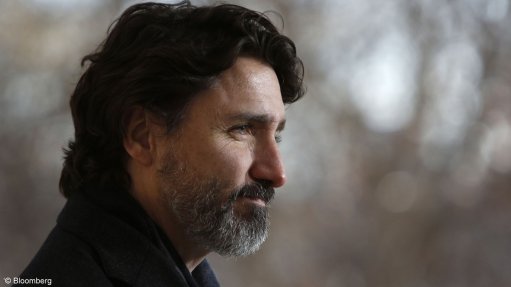
Canadian PM Justin Trudeau
Canadian Prime Minister Justin Trudeau's plan to cut greenhouse gas emissions from the oil and gas sector will not be ready until late this year or early 2023, the environment minister said on Tuesday, leaving a major hole in an emissions reduction plan due to be released by the government this month.
Oil and gas production is Canada's highest-emitting industry and a main focus of Trudeau's goal of chopping emissions by 40% to 45% by 2030, based on 2005 levels.
Environment Minister Steven Guilbeault told Reuters that Ottawa needs more time to consult with industry, unions, environmental groups and the provinces to sort out what mechanism it will use to cap and then cut oil and gas emissions.
"On the oil and gas cap, there are still a lot of discussions in terms of how do we do it from a structural point of view, what kind of vehicle do we use," Guilbeault said from Toronto, adding that options include creating a cap-and-trade system for the industry.
"The ERP (Emissions Reduction Plan) will not say how we'll do the oil and gas cap, because we're consulting and we don't know how we will do it."
Guilbeault is the first Liberal minister to rule out including the oil and gas cap in this spring's plan, although he has previously said work on it may extend beyond 2022.
A government official said it had never necessarily targeted spring to clarify how the oil and gas cap will work. The government may outline the ERP on March 29, he said.
The government has not determined what year it will use as a benchmark for capping oil and gas emissions and then reducing them, Guilbeault said. He added that the ERP this month will set projected carbon levels by sector, including for oil and gas, but these targets will not be legally binding and may change.
This spring is pivotal for Trudeau's plans to address climate change, with the emissions reduction plan, final regulations to reduce the carbon intensity of fuel and details of financial support for carbon capture facilities all due.
New policy takes time to develop, but having to wait possibly to 2023 for draft emissions regulations shows lack of urgency, said Dale Marshall, national climate program manager at Environmental Defence.
"When it comes to oil and gas, the federal government keeps showing up with bagfuls of carrots. But a regulatory stick always seems hard to find," he said.
Simon Donner, a climate science professor at the University of British Columbia and a member of a government advisory body, said addressing oil and gas emissions is critical.
"If we don't do something to address oil and gas, then growth will continue and that would negate any chance of meeting 2030 targets," Donner said.
Guilbeault, a former Greenpeace activist, said he expects Finance Minister Chrystia Freeland to finalise a carbon capture tax credit soon, with the budget unveiling weeks away, and he does not anticipate any delay to releasing Clean Fuel Standard regulations this spring.
"In climate and energy policy right now, the number of files on the move is just staggering," said Bora Plumptre, research director at Electric Mobility Canada, an organization whose members include utilities and equipment manufacturers.
"They are having a really tough time figuring out how they are going to get to that (emissions reduction) target."
One way to get there is for governments to work collaboratively with industry by cutting the red tape that carbon capture projects face, said Tim McKay, president of the country's biggest oil producer, Canadian Natural Resources.